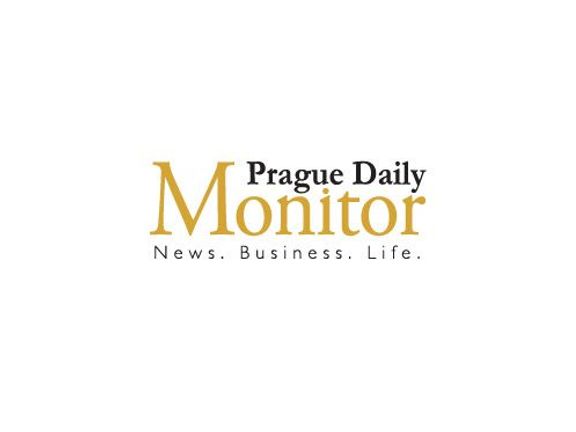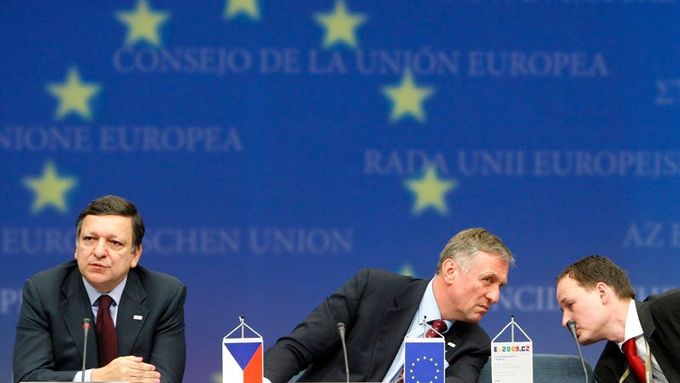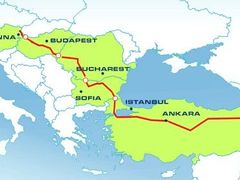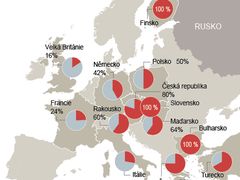Prague - The Czech EU presidency is going to take a historic step next week. At the Southern Corridor summit on 8 May, it will offer countries around the Caspian Sea and the Mediterranean Sea new cooperation with the European Union in exchange for gas supplies from their rich sources.
"The EU must move from words to action. We should finish and sign the intergovernmental agreement on the Nabucco gas pipeline in June 2009," outgoing Czech Deputy PM for European Affairs, Alexandr Vondra, commented on the main objectives of the summit.
Diversifying gas supplies to reinforce Europe's energy security has been one of the priorities of the Czech EU presidency since its very beginning. So when presenting the goal next week, the outgoing Czech government can have its moment of fame, but it could also be as embarrassing as the recent meeting of regional development ministers where only six guests turned out of the 26 that had been invited.
Czech Republic in the role of biblical king
The invited guests are to confirm their participation by the end of this week. And there is quite a lot of them - the Presidents and Prime Ministers of Turkey, Azerbaijan, Turkmenistan, Kazakhstan and Georgia. Apart from Czech PM Mirek Topolánek, the guests are also to talk to European Commission President José Manuel Barroso and EU's foreign policy chief Javier Solana.
Moreover, representatives of Egypt, Iraq and Uzbekistan have been invited as "involved" observers and will be offered participation in the project as well. Representatives of the USA, Russia and Ukraine should take part in the summit as "uninvolved" observers.
The Czech presidency will try to bring to life a project that many regard as a non-starter already.
Like the biblical king Nebuchadnezzar in Verdi's opera, whose name the planned Nabucco pipeline bears, Czechs will make an attempt at a surprising turnaround at the end of the last act. Instead of taking Jews out of Babylonian captivity, Czechs will try to take the European Union out of its dependance on supplies of Russian gas that are too often influenced by the mood in the Kremlin.

There is a lot for Europe to catch up with. "Russia's rival gas pipeline South Stream, which copies the route of Nabucco, is being built already. They have concluded specific agreements with individual countries," said Vladimír Štěpán from the analytical company ENA.
He himself does not see much of a chance for Nabucco, which should be launched as early as 2014, according to the original plans. Because if Russia finishes its South Stream earlier, it's a question whether at all there will be demand in Europe for gas from Nabucco.
Moreover, said Štěpán, there "isn't enough gas for Nabucco." Azerbaijan was to be the main source, but its president said in Moscow last week that the country's gas will go via Russia only. Also waiting for Azerbaijan's gas is the TGI pipeline from Turkey via Greece to Italy as well as India and China.
EU wants to compete with Russia by means of know-how
Two weeks ago, the German gas company RWE signed a memorandum on the development of giant sources in Turkmenistan. "However, there is no pipeline there, so it will take another couple of years to build it," Štěpán said. The main obstacle to the success of Nabucco, he said, is the long-term disunity of Europe which does not have a single energy security policy.
But still, Europe has a lot to offer to the gas countries, said Vondra. "Producers and the transit countries will get access to know-how and modern technologies of the countries that would buy their gas," he said in his speech in Turkmenistan during his trip to the region.
Czech EU presidency spokesman Jiří František Potužník said the European Union will therefore try to compete with the Russian South Stream by means of bigger "value added" of its southern corridor. He reminded that EUR 4 billion of the EUR 5 billion package approved to revive the EU economy will be spent on energy infrastructure and part of the sum will go directly for the launch of Nabucco.
"Everyone will give them money, but we are offering a much broader and long-term cooperation," said Potužník. That means, among other things, building a traffic artery, for instance a railway corridor, to boost trade and exchange of people and knowledge. According to Vondra, it would be the beginning of new cooperation between the EU and the Caspian area, central Asia and "maybe also the Middle East".
PM Topolánek presented this offer during his February trip to the region and, Potužník said, "the response was quite good".
Adapted by Prague Daily Monitor.


